The Ryburgh Foundry
Part 3. Everitt Adams & Co Ltd.
The beginning of the end
1881-1884
The new decade finds the partnership registering as a new Limited Co.in July 1881.
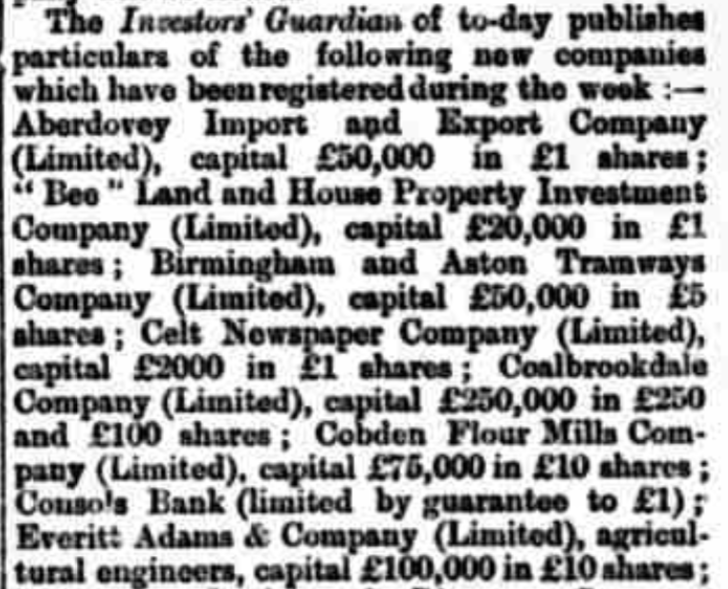
July 15 1881 Birmingham Daily Post


This was also when we find Percy Everitt’s inventive genius starting to outgrow both Agricultural Engineering and Great Ryburgh as he began to fully experience London life. It is probably unwise to draw too much from the evidence that was presented during the Harrison v Harrison & Everitt case, since the case was found in favour of Harrison & Everitt. However some of it was given on oath by Percy and by his own admission he was living with Mrs. Forster after 1880 when he came to reside in London. We have seen from the 1875 press he was a keen sportsman and so it is not impossible that he used to frequent Lord’s Cricket-ground, but what inspired him to improve an Ice-Skate with a new design in 1880?
The “Rock Skate”, patented both in the UK and the USA in 1881 was advertised widely in the sporting press in the winter of 1881:
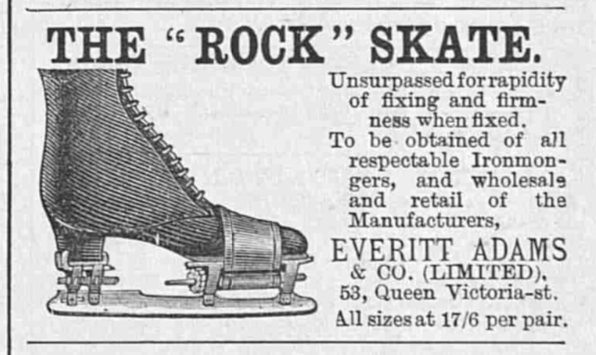
and in the winter of 1882:
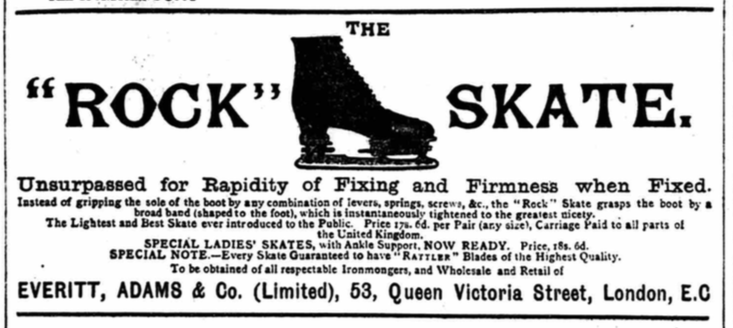
Was it something as homespun as this event, reported on January 3rd.1880 in the Norwich Mercury, that sowed the seeds for this skate’s appearance on the market?
GREAT RYBURGH
SKATING PARTY – A large party of ladies and gentlemen, a few days since, enjoyed several hours’ skating on the moat in the occupation of Isaac Everitt, Esq., J.P., Mrs. Everitt entering fully into the pleasure of the company by providing a plentiful supply of tea and other refreshments.
Many of Percy’s obituary notices from 1893 comment on
”his first novelty, the “Rock” skate. Unfortunately our climate is so fickle that skates per se are not calculated to enrich an inventor, and skimmers o’er the ice have had peculiarly brief sport for many seasons past”
Whatever the inspiration, Percy was, at one time, a member of the National Skating Association and appears in a report of the Association’s Annual Meeting in November 1882 as seconder to the treasurer’s re-appointment.
Part of the report reads as follows:
“Several meetings were held in London towards the end of the season to consider whether steps could not be taken for providing artificially-produced ice, but these were not successful, owing to the extraordinary expenditure involved in the establishment of a glaciarium. The committee learns with pleasure that efforts are still being made with a view of rendering skaters in a measure independent of the seasons and they will be glad to learn that these efforts are successful………….A specimen of the new skating surface, referred to in the last paragraph of the report, was produced at the meeting by Mr. Everitt, and was inspected”
Was this new skating surface another Everitt invention and was he busy “networking”? I have not yet come across a Patent to that effect, but it is certainly not without the bounds of possibility!
By the time Foundry moulder, Hector Middleton was reminiscing with David Howe into a cassette recorder in the 1970’s, the legend of the skate and its inventor still came to mind, an impression gained, if a little confusedly, after a working life in the foundry that started more than 30 years after Percy's death
And these Cooper rolling bearing people, to cut a long story short, they knew Ryburgh so well because their father lived in the Vines and one of their ancestors…. they reckon they were a very clever family, and when he invented these things he knew he couldn’t go, get too far at Ryburgh so he left Ryburgh altogether and that was a big blow to the Foundry cause he invented these here skates, ice skates and he put them on a...on a wooden, slide them on a wooden frame and they were about ………they didn’t have the means then to put them on like they do now - and these two Cooper brothers they went with naturally with their family to Lynn and they’ve kept ever since and they invented that split roller bearing.
************
Meanwhile back in Ryburgh, The Foundry and the Steam Ploughing business is run, probably mostly in Percy’s absence, by Thomas Cooper and William Wilson.
Somebody needed to be hands on, especially since they had been awarded the contract to supply the iron works (windows and roofs) for the new railway sheds and engineering workshops at Melton Constable.
The Ploughing Engines, however, were still being a problem on the roads as can be seen in the E.D.P. and Norwich Mercury for March 2nd. & 5th. 1881:
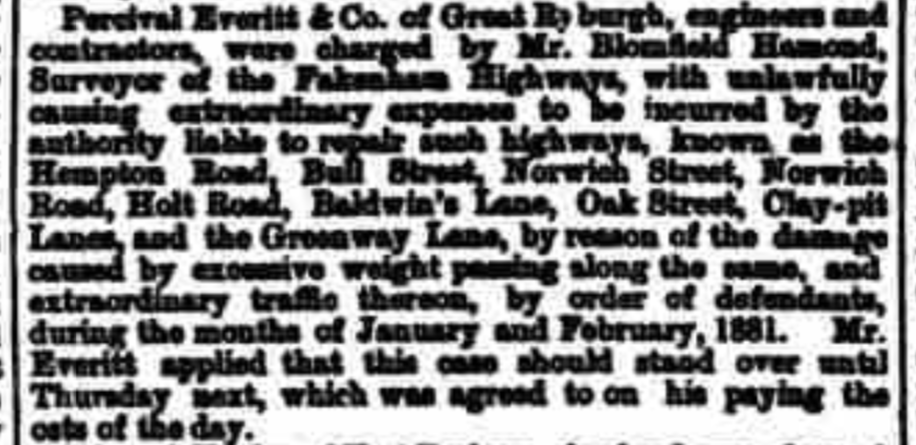
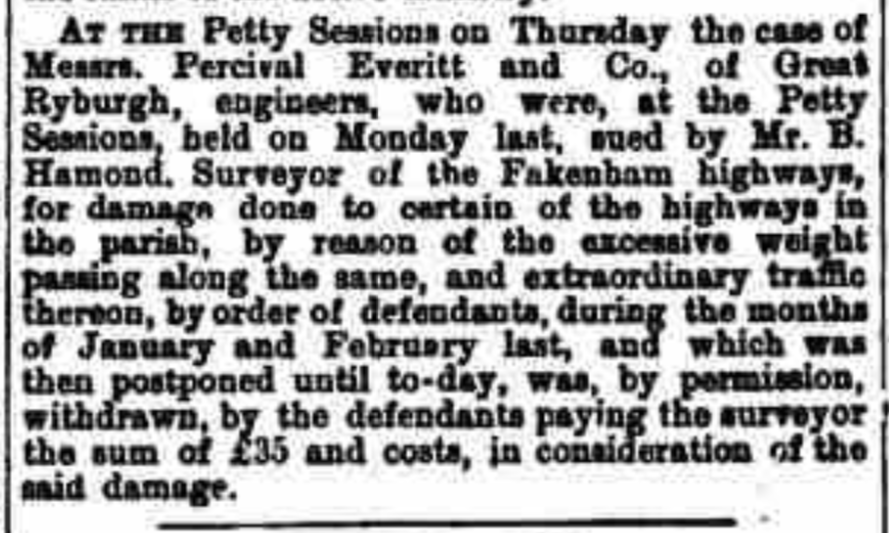
When Percy is at home, he and his father are busy being village benefactors and the Norfolk News reported this on May 20th 1882:
RYBURGH
ATHLETIC SPORTS -Saturday last was a gala day in this village. Owing to the kindness and liberality of Messrs. Everitt & Co, of St Andrew’s Foundry Works, great amusement was afforded to the spectators, who were admitted to the grounds for a trifling payment, while handsome prizes of money were awarded to the successful competitors in the several athletic sports. These consisted of throwing the hammer, high and long jumps, sack races, blindfold barrow race, and a most entertaining obstruction race. But the two displaying the most prowess were the mile and bicycle races, both of which were closely contested. Everything was conducted in the most perfect order and no pains were spared by Mr P. Everitt and Mr Wilson to make everything go off well. The Rector and his family, with all the principal people of the parish, were invited to witness these sports, and the former expressed his gratification at this evidence of kindly feeling and interest in the rational amusements of their workmen by such large employers of labor. All the visitors were hospitably entertained by Mr. and Mrs Everitt at the Manor House.
************
This Limited status of Everitt, Adams & Co. now makes it possible to give a reasonably accurate date to the earliest Ryburgh Foundry artefact that I have seen to date It is a very heavy Book Press
“The Railway Press”
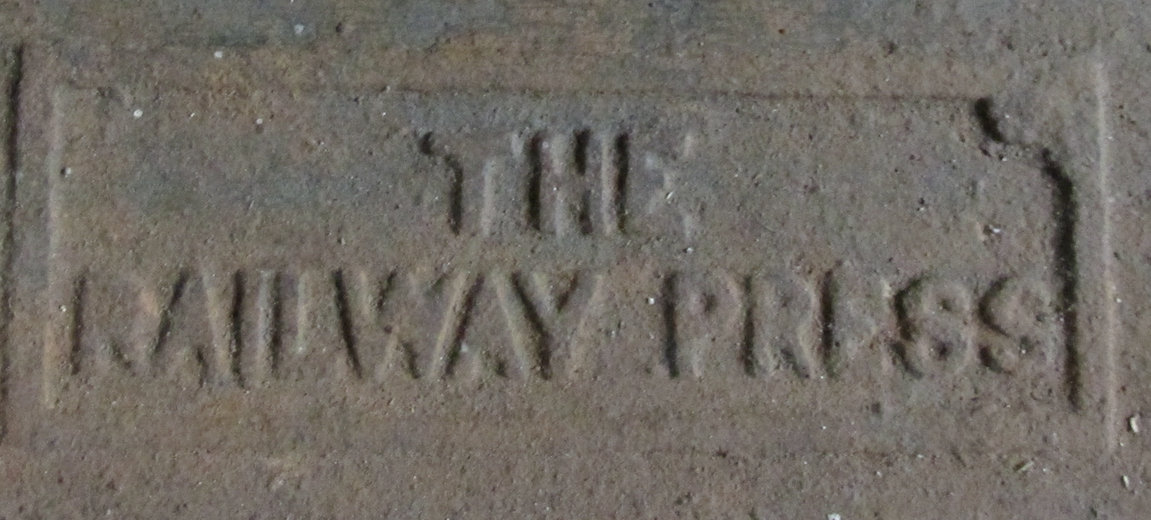
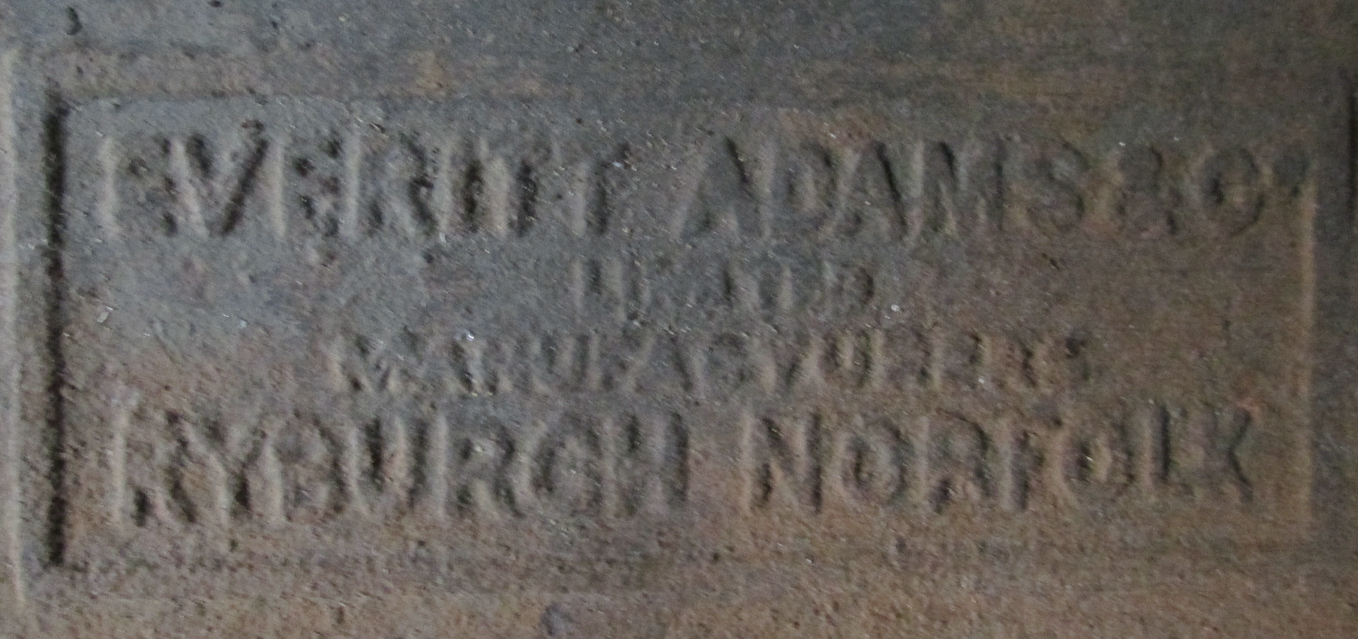
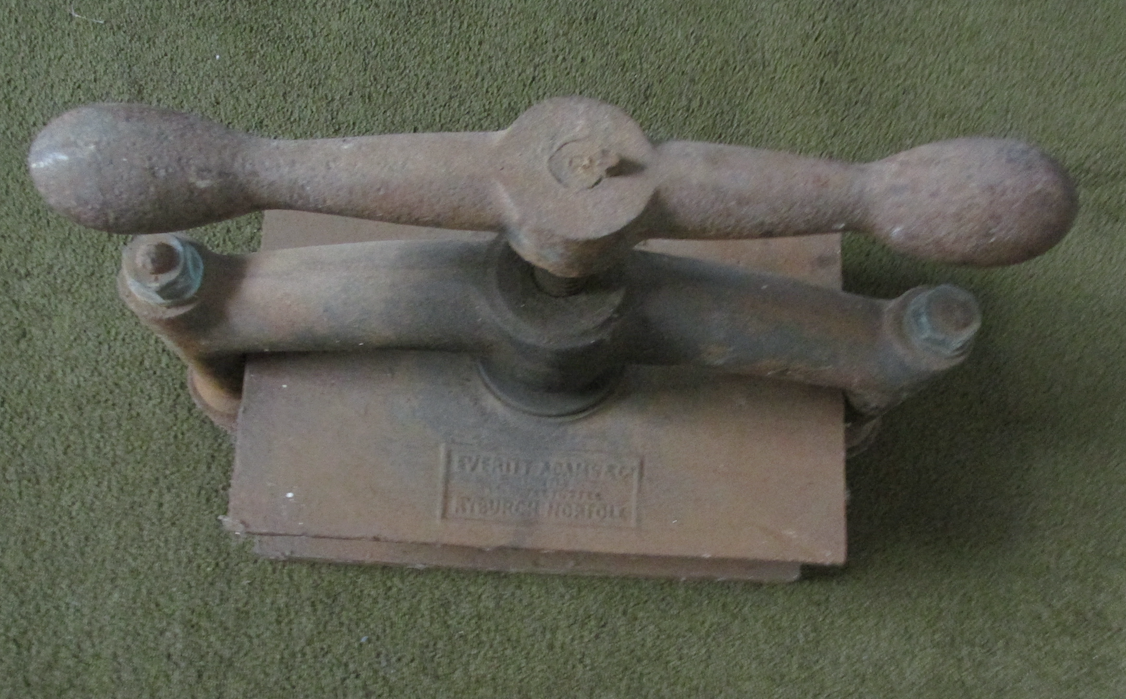
However, not long after, in September 1882, both the Everitt/Adams and Everitt/Wilson Partnerships were dissolved.
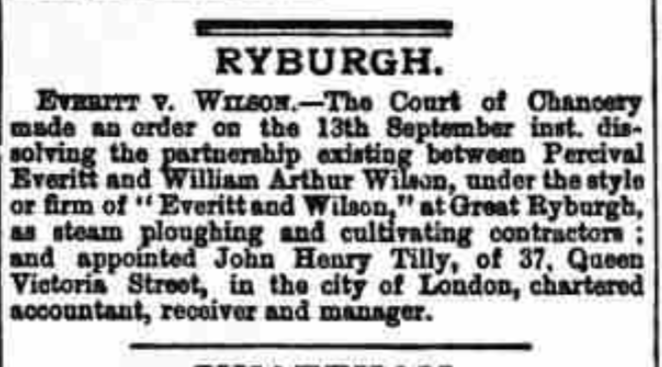
William Wilson was working as “Outdoor Manager” to Thomas Cooper at Ryburgh until May 1897 when he started his own business as W. Arthur Wilson & Co (steam digger proprietor and agricultural contractor ) By 1905 according to the Norfolk Chronicle for April 1st., he was bankrupt with liabilities of £1631-13/- 11d.
“The debtor acknowledges that he has been insolvent for the past three years and has incurred liabilities with that knowledge”
This must have left Percy a much freer agent and with things ticking over nicely in Ryburgh, he was able to engage more fully with his inventive skills.
Also in 1882, the Manor House lease now names him jointly with his father and as being of Ryburgh. He was nevertheless still addressing engineering problems perhaps encountered and solved at Ryburgh and a new forge tuyere is described below in “The Engineer” and apparently a success by 1883:
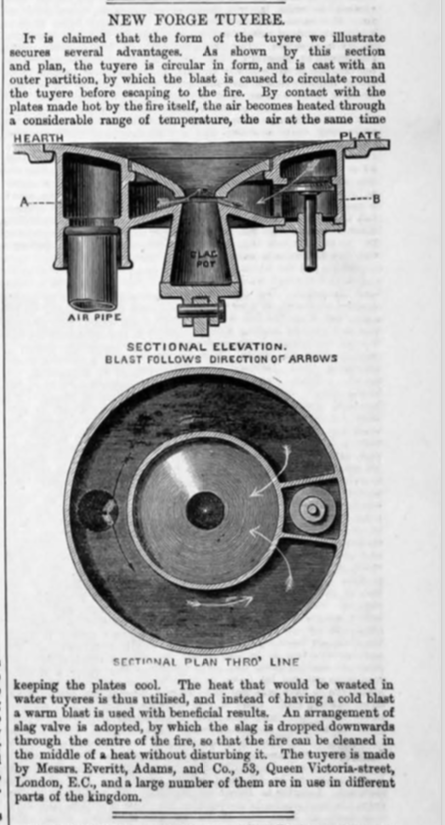
1883 is without doubt the year that changed the course of Percy’s life, told to us today by this very modest notice, again in the Birmingham Daily Post:
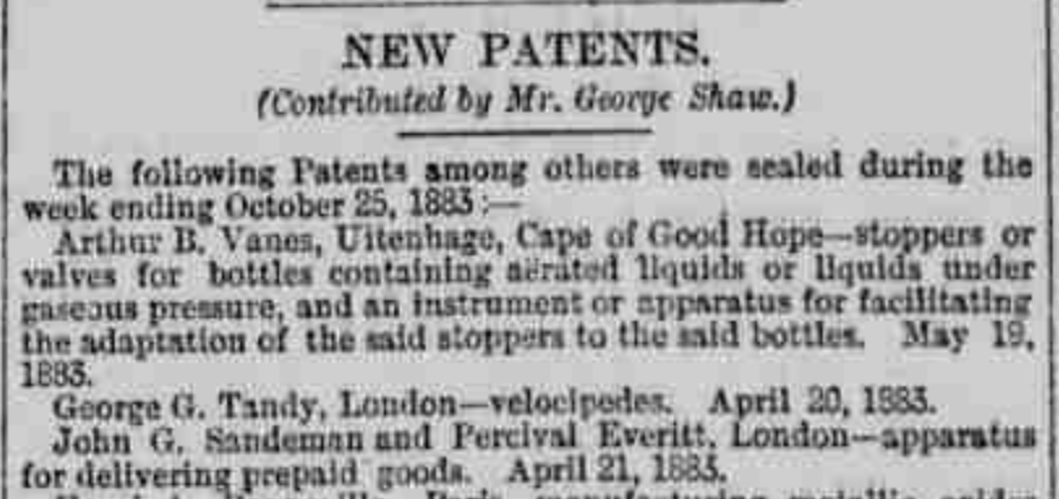
This is the patent by which he has been claimed the inventor of the “penny in the slot machine” and the start of what should have been the making of his fortune and becoming a Victorian celebrity. The truth of the matter is to be found in Nicholas Costa's latest book, " to whom we are greatly indebted, and who some time ago emailed to me the following information as I began researching John G. Sandeman who was nominally a merchant in the City of London with the Freedom of that City granted in 1880.
John Glas Sandeman M.V.O., Captain in the Royal Dragoons, Lieut-Col. Commanding Essex Yeomanry, Hon Lieutenant Royal Naval Reserve, Sub-Officer of Her Majesty’s Royal Body Guard of the Hon Company of Gentleman-at-Arms to Queen Victoria. He was the one directly responsible for awakening Everitt’s interest in coin operated devices. Put briefly, they met, along with the future King Edward VII. at a farming exhibition and struck up a working relationship. Sandeman had purchased a large coin collection and had an interest in coins as well as machinery. It was he that suggested Everitt make a coin op postcard/ stamp vender, having encountered other early coin operated devices and because he had connections in the right places and could therefore fix the tax issue. However young Everitt, as we have seen, when he came to London turned out to be a naughty boy. The Harrison trial/ divorce in London was a legal fix designed to avoid scandal. Percy rushed off to the US to get married, and Sandeman quickly sold off any interests he had in the business and spent the next few years denying involvement in the whole sordid affair...until the early1900's when machines were all the rage and Percy long since dead. Then he started once more to acknowledge his role in the affair!
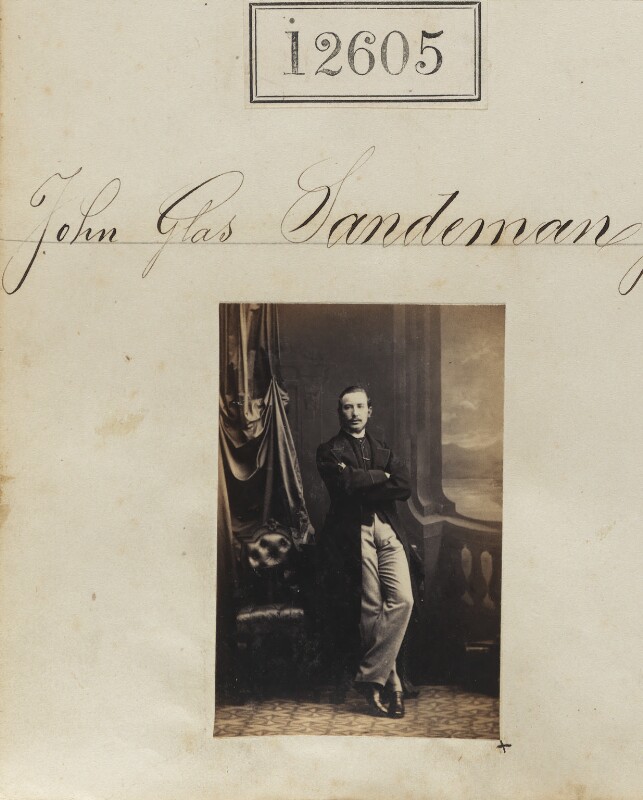
John Glas Sandeman © National Portrait Gallery, London
by Camille Silvy
albumen print, 3 February 1863
NPG Ax62250
The inclusion of the family name Glas was the result of the marriage of Thomas Sandeman and Anne Glas the daughter of the Revd. John Glas founder of the Glasites also known as Sandemanians that broke away from the Church of Scotland in 1730. They were the Great-Grandparents of Percy’s co-patentee who on outward appearance had not adhered very closely to the family’s religious persuasion, except perhaps by his interest in Electricity as an Associate of the Institution of Electrical Engineers……. Michael Faraday being a prominent Elder of the Sandemanian Meeting Houses in London up to 1864.
**********
The following brief notice appeared in the Norwich Mercury on June 25th 1884:
EVERITT.- On the 21st inst., at Ryburgh, Isaac
Everitt Esq., J.P.
Upon Isaac’s death, there was now longer the need for Percy to be in Ryburgh and the remainder of the 1882 lease was assigned to John Blomfield of Foulsham/Billingford.
John Blomfield went on to be Rector’s churchwarden to Revd. Morris Fuller.
P.S.
Percy was initiated into Freemasonry at the Joppa Lodge in Fakenham on November 20th 1879 and had membership there until his resignation in December 1884. He was joined on 18th.December by William John Adams (Ryburgh)who also resigned in December 1884 and in October 1880 by William Arthur Wilson (Ryburgh) who resigned in December 1883 and in November 1880 by Thomas Cooper whose resignation is not recorded.
************
After Isaac's death, Maria moved to London and was living at “Lion Villas Kew Road Richmond” and which Percival has as his address in 1887 and 1888 according to the Surrey Electoral Registers for those years and as we have seen, by 1881 Percival had effectively left Ryburgh. He is described as of "London" in one of the above 1881 patent notices and London Engineer on a patent of 1882. According to a further patent, Messrs. Everitt, Adams, & Co. were trading at 53 Queen Victoria Street, London E.C. After his father’s death he lived for a brief spell in America where a descendant writes that he had married Emma Potter on 27 Feb 1886 in Hoboken New Jersey. The wedding record says she was 26. and has been described as a widow by another Everitt researcher. He had what appears to have been an unsuccessful business venture as the Everitt Manufacturing Company which made a variety of “nickel in the slot” machines for the vending of small items. It was then back to London and in July 1886 he featured in the very high profile divorce case which was reported at some length in the press. But still the inventions and patents kept coming:




June 14 1887.Percival Everitt, London-filters.
April 1889 " An improved case or receptacle from which an opera-glass or the like can be hired by depositing a coin of predetermined size and value therein" Percival Everitt, London.
A complete list of Patents has yet to be assembled.
Not surprisingly he was an early user of the telephone and had the telephone number 1554 in the 1885 Directory at 11,12 &13 Huggin Lane E.C which were probably his business premises. The 1890 Directory gives the same number but by then he was at 47 Cannon Street as given on the 1886 patent above.
In the 1891 Census aged 34 Percy and Emma now aged 30 were living at 17 Holland St Kensington, London. He returned to New York with Emma and on December 31st 1892, disembarked the UMBRIA at Ellis Island. Six weeks later Percy was dead.
The facts of the matter and the aftermath are not yet fully understood but he is remembered thus on his father and mother’s memorial stone in St Andrew’s churchyard:
“And of Percival only and dearly beloved son of the above, born May 12th 1856, died at New York February 19th 1893, interred in Evergreen Cemetery Brooklyn.”

Even after his death US Patents were still being filed by his lawyers, one of which was for a Velocipede, rather indicating he had not quite forgotten his early adventure from Ryburgh to Ware:
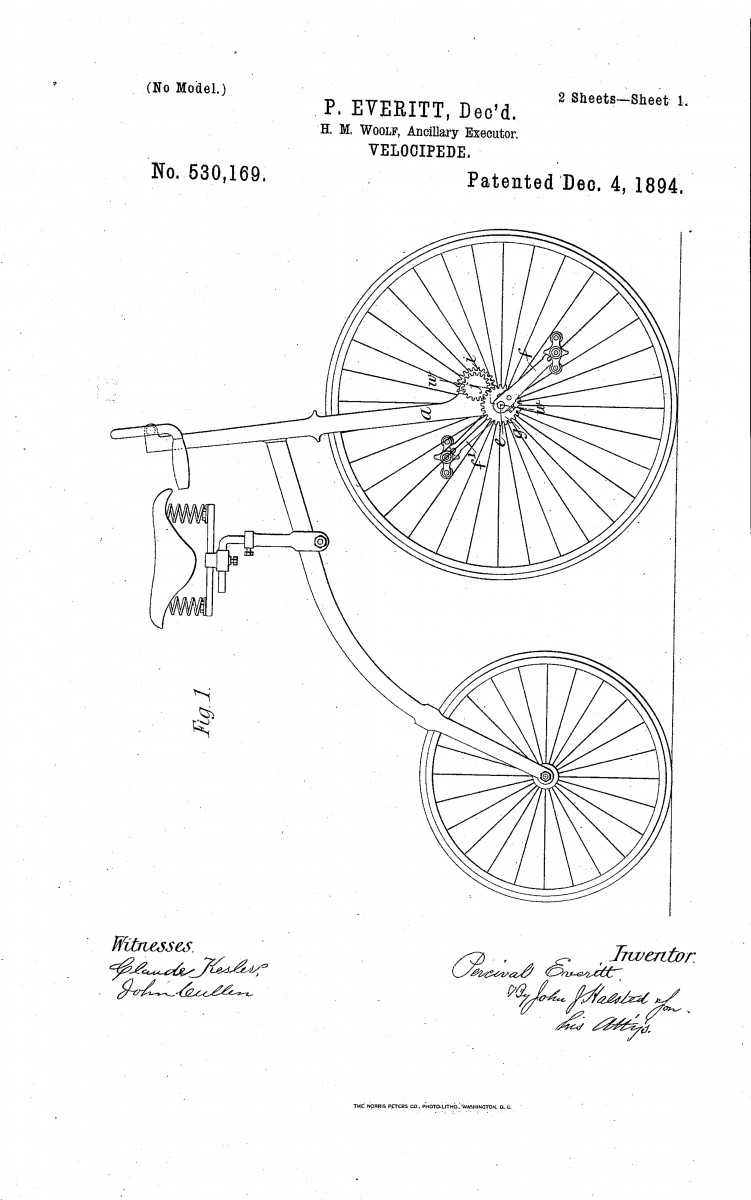
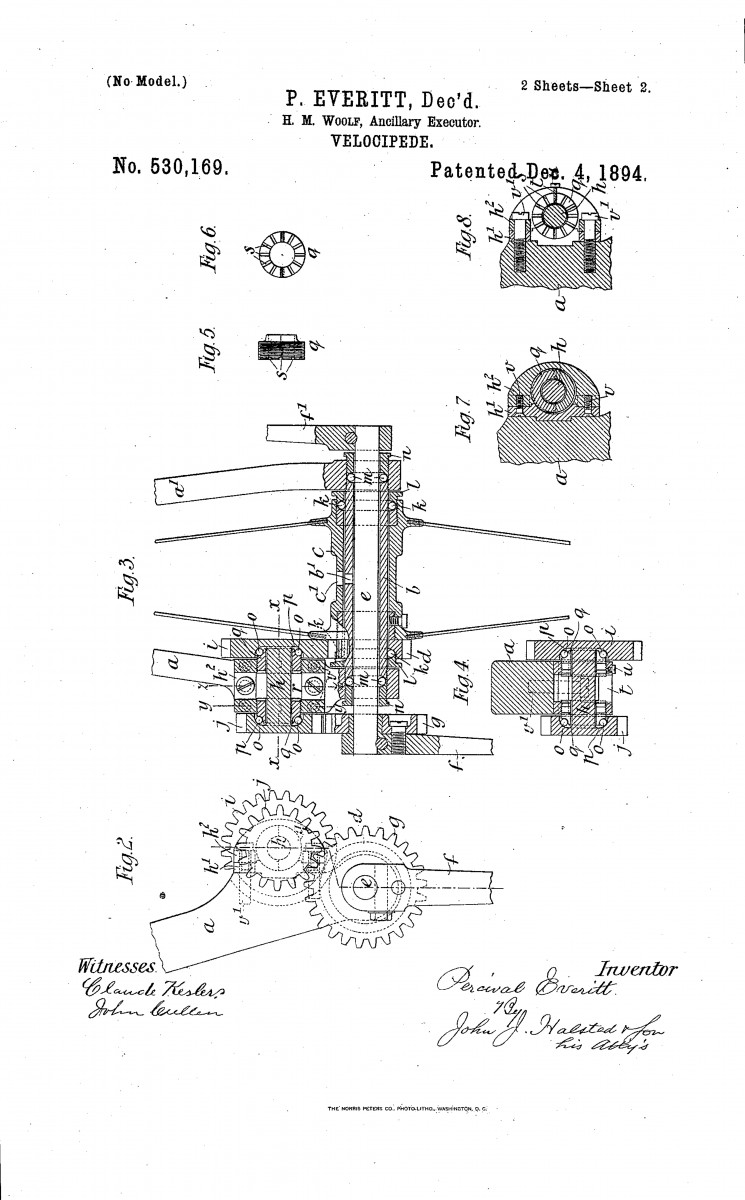
Our thanks are again due to Nicholas Costa who for more than 30 years has been fascinated by the extraordinary and largely unsung Percy Everitt. He has kindly been able to fill in some fascinating pieces of this enigmatic character's life story, including his last will and testament:
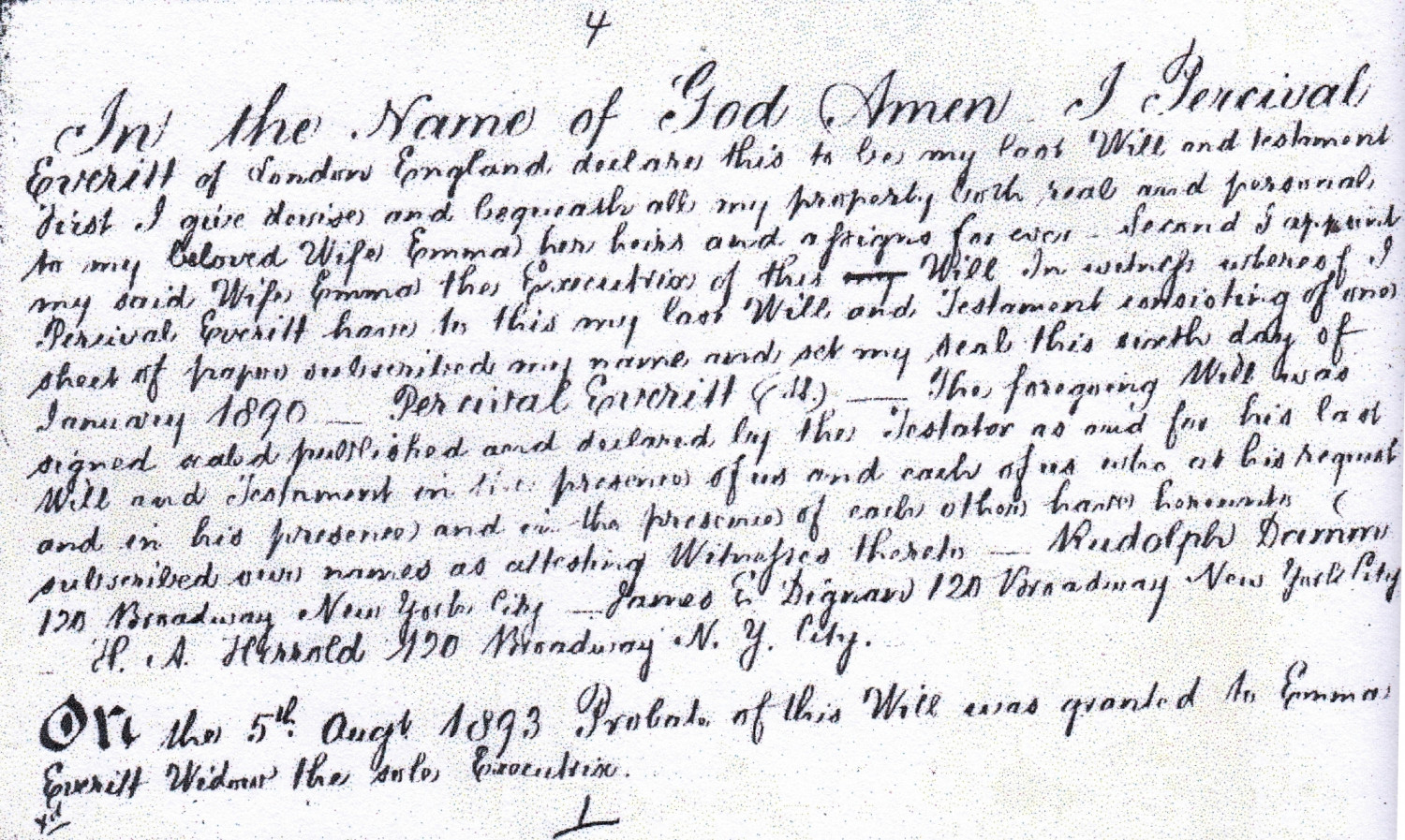
The National Probate Calendar for 1893 shows that at Percy's death, his "Effects" amounted to £71-10/-. Considering the huge amounts of money his inventions and business ventures made or could have made, he seems to have fared very badly indeed. This source also states that his death occurred on February 19th 1893 at the Union-square hotel in New York and that Probate was granted in London on August 5th that year to his widow, Emma Everitt.
The following widely circulated obituary gives us a potted biography of Percy Everitt. Some of the assertions of the compiler prove to be at odds with what has been discovered above. However, given that his d.o.b.is 5 years adrift, the 1872 date would proportionally be 1877 as a start date for the Foundry, the date strongly suggested by the other evidences.
Mr Percy Everitt, whose death occurred very suddenly at the Milwaukee Hotel New York, recently, had a brief but somewhat remarkable career as an inventive genius. He was born at Ware, Herts, in 1851, and when his parents removed to Great Ryburgh, Norfolk, Percy was sent to be educated by Dr Jessopp at Norwich Grammar School. From an early age he turned his mind to mechanics, and on leaving school went through a course of study under Mr. R Adams at the Bow Railway Works, standing at the lathe and forging his way in the fitting shops through every department of the engineering curriculum, thus gaining technical knowledge which proved of great value to him in after life. He started making agricultural machinery at Ryburgh about 1872, and at his father’s death Everitt to London with his first novelty, the “Rock” skate. Unfortunately our climate is so fickle that skatesper se are not calculated to enrich an inventor, and skimmers o’er the ice have had peculiarly brief sport for many seasons past. But Mr. Everitt is best known to fame through his patent automatic machinery for supplying the public with all sorts of daily necessities by “putting a penny in the slot.” First came postcards and envelopes, then sweetmeats, cigarettes, and scents, and finally your height, weight, and strength, as all know, may be ascertained while waiting for a train. These familiar machines proved such a “boom” that companies were speedily formed for carrying out the enormous business with all its ramifications that resulted; royalties were granted, and the ingenious novelties started up at railway stations and points of vantage all over the world, bringing prosperity to the inventor and employment to thousands. The deceased gentleman had other important developments in hand when death stepped in and cut him off in the very prime of life.
************************
We had a most fortuitous visit from David Wicks the descendant of a Farmers' Foundry carpenter, a man still remembered by a few as "Old Wicks". After the death of his first wife Martha in 1916, Alfred Wicks married again in November 1917 to Nellie the daughter of Doyley Thompson ,an iron moulder at the Foundry, who had died in May that year. David very kindly let us have a copy of a photograph of Alfred and his new wife Nellie standing outside their home Aldworth Cottage, still there on the Fakenham Road but looking rather different today:
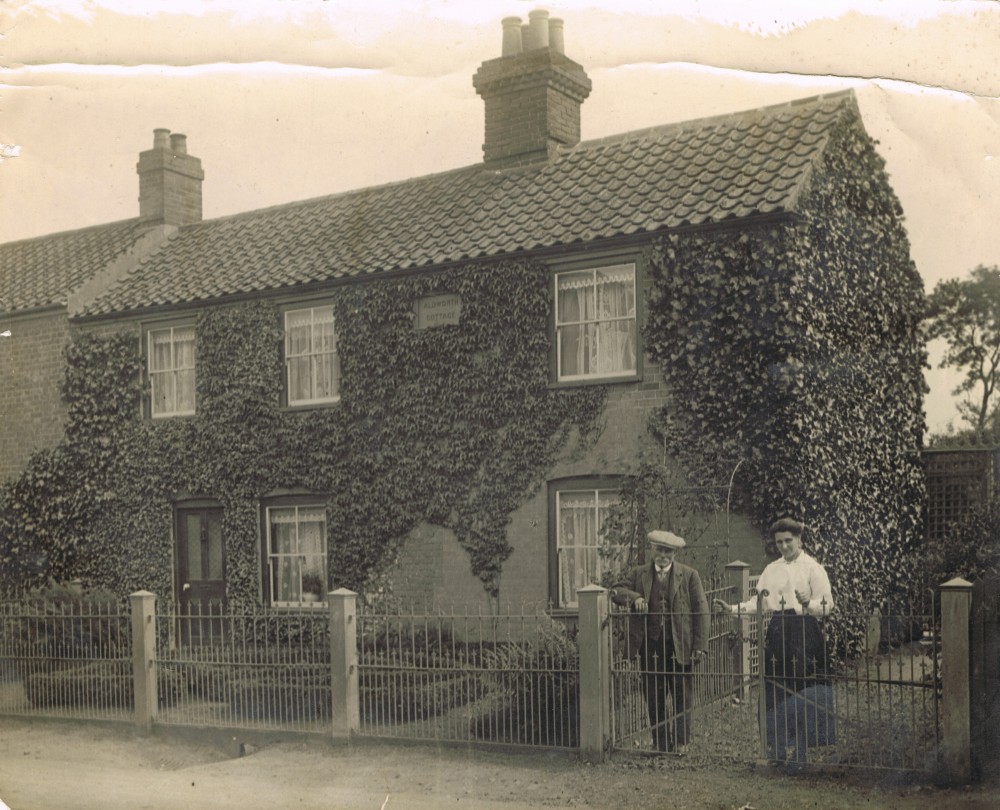
David also had a photograph of some farm machinery and written on the reverse was the following:
Everitt's Threshing Machine made by Tyrell Cooke & Alfred Wicks Gt Ryburgh
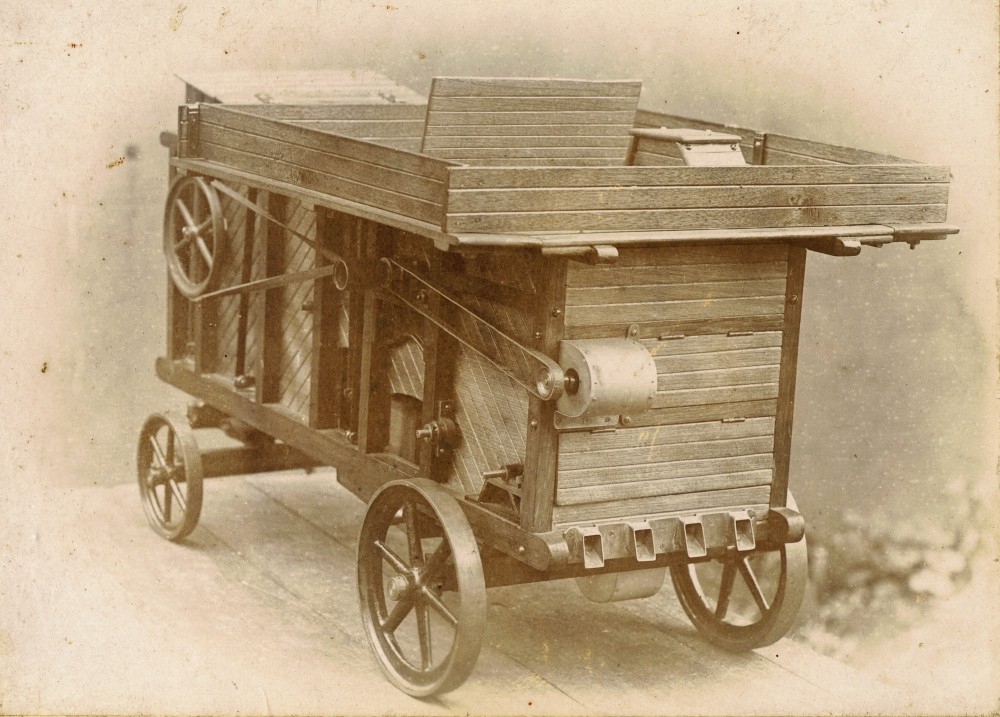
Tyrell Cooke" Mechanical Steam Engineer" was also Farmers' Foundry Works Manager in the first decade of the C20th. and there is some circumstantial evidence that prior to that he could have been a salesman for some of Percy Everitt's inventions. He is described as an "Agent for Automatic Machines" in the 1891 Census and his eldest daughter, Mildred was born in America soon after that and around the time that Percy was there. Tyrell Cooke was also witness to a US Patent of April 1889 for "new and useful improvements in Coin-Operated Grip-Testing Machines"
The photograph on close examination seems to depict a scale model of this machine and probably dates from around 1910. Perhaps the real thing was produced at Ryburgh and this model was exhibited at trade exhibitions to attract orders? What ever the fact of the matter, Percy Everitt was still in the minds of Farmers' Foundry workers well over a decade after his death.
copyright 2020
Peter Trent